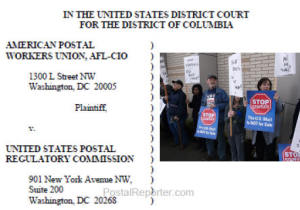 According to APWU: Shortly after the program got underway in October 2013, the APWU requested detailed information about the terms of the arrangement as well as correspondence between the USPS and Staples. APWU objects to the Staples deal because it privatizes the retail operations of the public Postal Service; transfers living-wage, union jobs to high-turnover, low-wage jobs, and degrades service to the public
According to APWU: Shortly after the program got underway in October 2013, the APWU requested detailed information about the terms of the arrangement as well as correspondence between the USPS and Staples. APWU objects to the Staples deal because it privatizes the retail operations of the public Postal Service; transfers living-wage, union jobs to high-turnover, low-wage jobs, and degrades service to the public
The Postal Service claimed the union had failed to establish the relevance of the information it sought and said the APWU’s request was “overly broad” and “burdensome.” USPS also asserted that much of the information was confidential.
APWU file a National Relations Labor Board complaint against USPS. Just prior to the April 1 NLRB hearing, the Postal Service gave the APWU a heavily redacted copy of the agreement that obscured most of the details of its contract with Staples. Many of the deal’s 58 pages were completely blacked out. In the decision, NLRB Judge Fine rejected each of the Postal Service’s claims and ordered the Postal Service to provide the APWU with most of the requested information, including thousands of emails between the USPS and Staples.
APWU submitted a FOIA request to PRC on May 30, 2014 seeking information regarding the USPS’s service agreement with Staples, Inc. The Postal Regulatory Commission denied the request on June 11, 2014. In rejecting the APWU’s FOIA request, the PRC cited 5 U.S.C. § 552(b)(4), known as “Exemption 4” to FOIA. APWU administratively appealed the Postal Regulatory Commission’s decision on August 8, 2014. PRC rejected this administrative appeal on September 2, 2014.
APWU filed a lawsuit on November 4, 2014 in the U.S. District Court against the Postal .Regulatory Commission (PRC). APWU is requesting the immediate release of all information pertaining to USPS/Staples deal.
APWU is arguing that in denying the FOIA request, the PRC failed to explain adequately how the requested information fit under Exemption 3 or Exemption 4 to FOIA given the APWU’s request. Additionally, “the PRC failed to distinguish between the contract itself and any specific information it claims must be redacted as confidential, in contravention of the law.”
According to the lawsuit:
The PRC’s own denial of the APWU’s administrative appeal acknowledged the difference between specifically redacted information and entire documents such as contracts: “the public filing entered in the Commission’s docket typically contains Governors’ Decisions, contracts, and other supporting documents in which any confidential commercial or financial information is redacted.” Ex. E at p. 2. Yet the PRC refused to provide even the redacted version of these ostensibly public documents in response to the APWU’s FOIA request.
The PRC denied the APWU’s FOIA request on the grounds that doing so would “reveal confidential commercial information, such as the very existence of a negotiated service agreement, the identity of the customer, or the number and types of agreements.” Ex. E at p. 2. Yet the Postal Service has publicly announced its agreement with Staples, in press releases, on the USPS.com website, and at public ribbon-cutting ceremonies. Having publicly disclosed the Staples pilot program, the existence of the Postal Service’s contract with Staples is neither a trade secret, nor is it the type of information that under good business practice would not be publicly disclosed.
In denying the APWU’s FOIA request, the PRC categorically withheld all requested information under either Exemption 3 or Exemption 4, without distinguishing between the contracts and documents requested as a whole and any specific information asserted to be protected by Exemption 3 or Exemption 4. This blanket denial contravenes the law including Piper & Marbury, L.L.P. v. United States Postal Service, No. 99-2383, 2001 WL 214217 (D.D.C. Mar. 6, 2001).
In denying the APWU’s FOIA request the PRC failed to provide a Vaughn index, a description of each document withheld or redacted, and an explanation of the reasons for non-disclosure, as required by Vaughn v. Rosen, 484 F.2d 820 (D.C. Cir. 1973).
In denying the APWU’s FOIA request the PRC failed to conduct a segregability analysis and disclose all reasonably segregable, non-exempt portions of the records requested
In denying the APWU’s FOIA request, the PRC failed to explain how the requested information fit either Exemption 3 or Exemption 4 given the substantial public voluntary disclosures of information that both the Postal Service and Staples have made regarding the existence of the negotiated service agreements to the general public.
By each of these acts and omissions, Defendant has violated the Freedom of Information Act.
APWU is requesting that the court order the Postal Regulatory Commission to immediately and expeditiously process the APWU’s FOIA request and disclose the requested records to the APWU in electronic format; and
In the event that the Court concludes that some information requested is exempt from disclosure, order the Postal Regulatory Commission to provide a redacted copy of the information requested, disclosing all segregable parts of the contract and documents requested